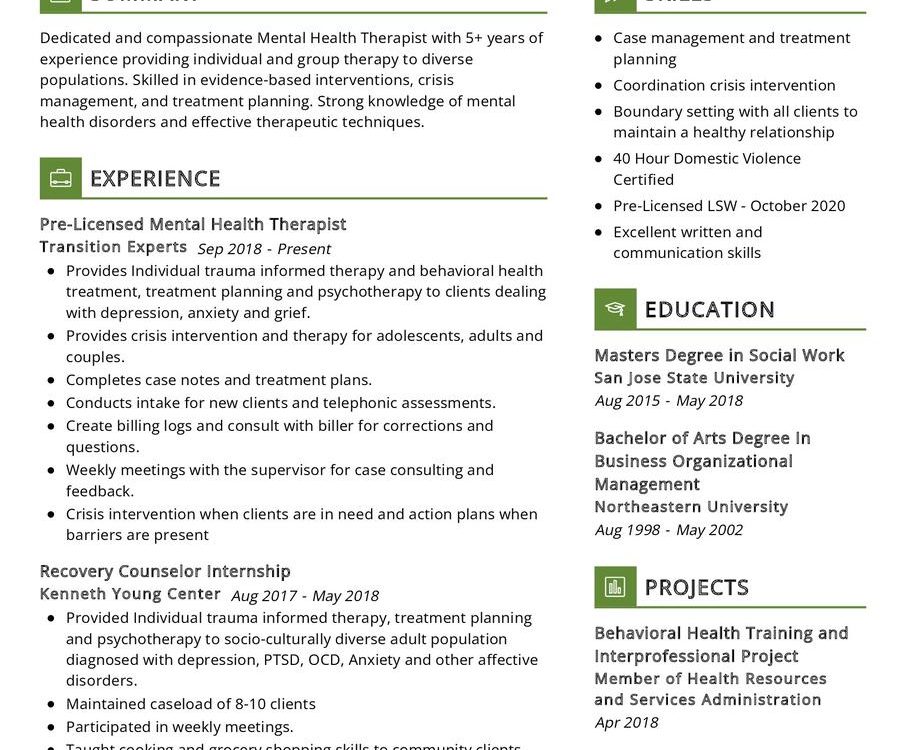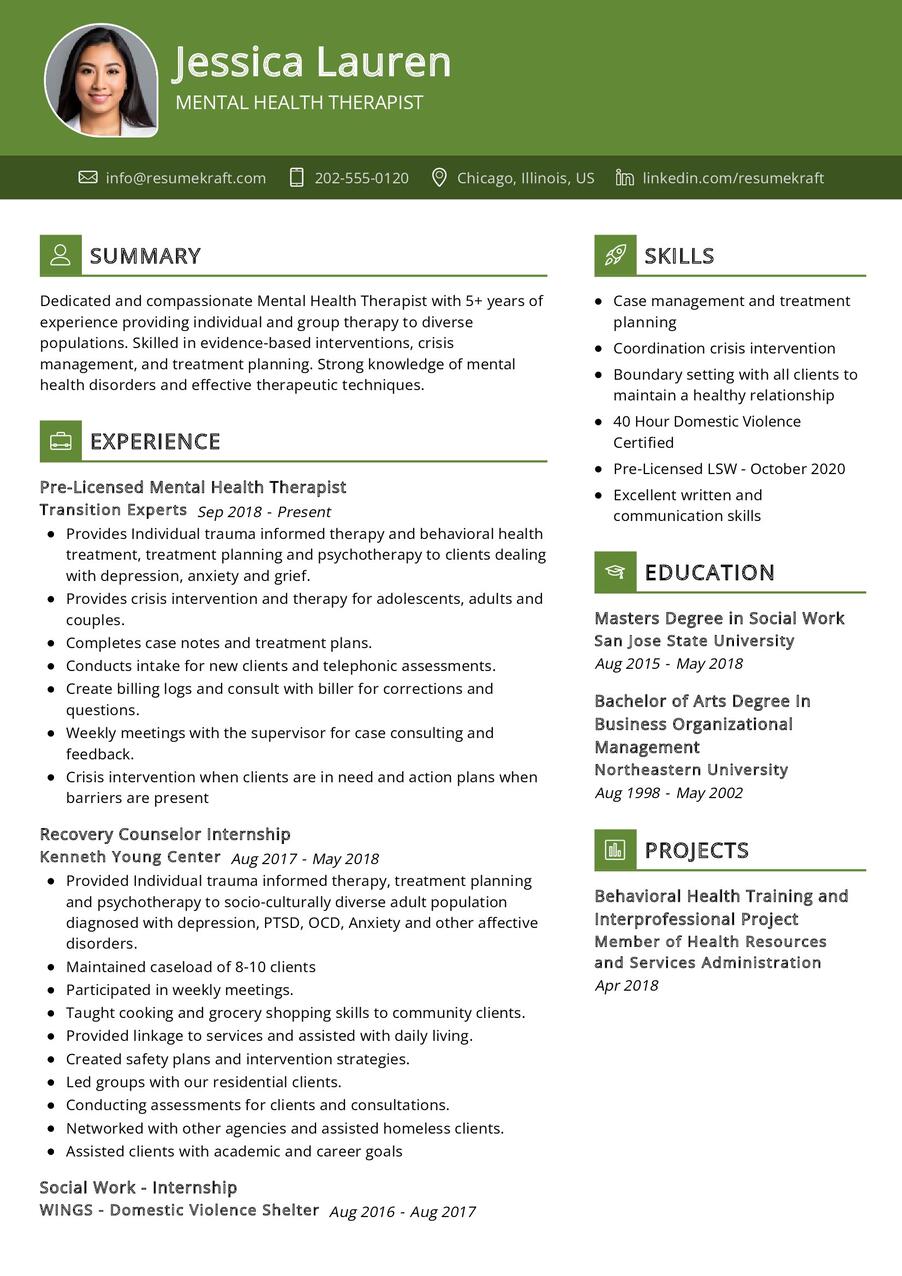The Vital Role of a Mental Health Therapist
In an era where mental health is gaining the recognition it deserves, the role of a Mental Health Therapist has become more crucial than ever. This position is a delicate balance of empathy, clinical expertise, and the ability to guide individuals towards mental well-being. Let’s explore the multifaceted responsibilities of a Mental Health Therapist and the qualifications required to excel in this rewarding field.
Qualifications for a Mental Health Therapist
Becoming a Mental Health Therapist is a journey that demands a unique set of qualifications and skills. Here’s a detailed look at the prerequisites for stepping into this impactful role:
- A Master’s degree in Psychology, Counseling, Social Work, or a related field, showcasing a strong foundation in mental health theory and practice.
- Extensive clinical experience, gained through internships, supervised practicum, or hands-on therapeutic work.
- Licensure or certification as a Mental Health Therapist, demonstrating compliance with state or regional regulations.
- Specialized training in specific therapeutic approaches, such as Cognitive-Behavioral Therapy (CBT), Dialectical Behavior Therapy (DBT), or other evidence-based practices.
- Strong communication and interpersonal skills, essential for building trust and rapport with clients.
- Empathy and active listening abilities, crucial for understanding and addressing clients’ concerns.
- Knowledge of ethical guidelines and a commitment to maintaining confidentiality and professionalism.
Continued professional development through workshops and seminars is highly recommended to stay abreast of the latest therapeutic techniques.
Responsibilities of a Mental Health Therapist
The role of a Mental Health Therapist goes beyond providing a listening ear. It involves a diverse set of responsibilities aimed at helping individuals navigate their mental health journey. Let’s delve into the core duties that define this profession:
- Conducting thorough assessments to understand clients’ mental health history, concerns, and goals for therapy.
- Developing and implementing personalized treatment plans, incorporating evidence-based therapeutic interventions.
- Facilitating individual or group therapy sessions, creating a safe and supportive environment for clients to explore their thoughts and emotions.
- Collaborating with other healthcare professionals, such as psychiatrists or social workers, to provide comprehensive care.
- Offering crisis intervention and support during times of emotional distress.
- Providing psychoeducation to clients, equipping them with coping strategies and tools for self-care.
- Maintaining accurate and confidential client records, adhering to legal and ethical standards.
- Engaging in regular supervision or consultation to enhance clinical skills and ensure ethical practice.
Each responsibility carries the weight of making a positive impact on someone’s mental well-being, making this role both challenging and rewarding.
Mental Health Therapist CV Writing Tips
Your CV is a powerful tool to showcase your qualifications and experiences as a Mental Health Therapist. Here are some tips to craft a compelling CV that highlights your expertise and stands out in the competitive job market:
- Start with a strong professional summary that encapsulates your passion for mental health, key qualifications, and therapeutic approach.
- Detail your educational background, emphasizing your Master’s degree, specialized training, and any relevant certifications or licenses.
- Highlight your clinical experience, providing specific examples of populations served, therapeutic modalities used, and outcomes achieved.
- Showcase your communication and interpersonal skills, essential for building strong therapeutic relationships.
- Include any additional skills or languages that may enhance your ability to connect with diverse client populations.
- Use quantifiable achievements, such as successful treatment outcomes or positive feedback from clients, to demonstrate your impact.
Your CV is not just a document; it is a reflection of your commitment to mental health and your ability to make a difference in the lives of others.
Mental Health Therapist CV Summary Examples
Your CV summary is the first impression you make on potential employers. Craft a powerful summary that captures your essence as a Mental Health Therapist:
- “Compassionate Mental Health Therapist with a Master’s in Counseling Psychology and a proven track record of guiding clients towards emotional well-being through evidence-based practices.”
- “Dedicated and licensed Mental Health Therapist with expertise in trauma-informed care and a passion for empowering individuals to overcome mental health challenges.”
- “Experienced Mental Health Therapist specializing in mindfulness-based interventions, fostering a therapeutic space for clients to explore and enhance their mental health.”
Your CV summary sets the tone for the rest of your application, so make it impactful and reflective of your unique strengths.
Building Your Mental Health Therapist Experience Section
Your experience section is the heart of your CV, providing a detailed narrative of your journey as a Mental Health Therapist. Here’s how you can structure this section to make it compelling:
- Detail your roles in chronological order, starting with your most recent position.
- Describe the settings in which you’ve worked, such as private practices, community mental health centers, or hospitals.
- Highlight the diverse populations you’ve served, such as children, adolescents, adults, or specific demographic groups.
- Showcase your therapeutic approaches, detailing how you’ve applied different modalities to address clients’ unique needs.
- Include any leadership or supervisory roles, demonstrating your ability to mentor and guide other mental health professionals.
- Quantify your achievements, such as the number of clients served, successful treatment outcomes, or improvements in clients’ mental health.
Each experience you include should contribute to the overarching narrative of your growth and impact as a Mental Health Therapist.
Education Section for Your Mental Health Therapist CV
Your educational background is a cornerstone of your qualifications as a Mental Health Therapist. Here’s how you can present your academic journey in your CV:
- Master of Arts in Counseling Psychology, XYZ University, a comprehensive program providing in-depth knowledge of therapeutic techniques, 2018.
- Bachelor of Science in Psychology, ABC University, the foundation of your understanding of human behavior and mental processes, 2015.
- Licensed Professional Counselor (LPC), obtained in 2019, showcasing your commitment to meeting state licensure requirements.
Your education section serves as evidence of your academic prowess and your dedication to continuous learning in the mental health field.
Key Skills for Your Mental Health Therapist CV
Your skill set is the arsenal you bring to the therapeutic space, encompassing both soft skills and clinical expertise. Here are the key skills that make a Mental Health Therapist effective:
Soft Skills:
- Empathy and active listening, essential for building trust and rapport with clients.
- Effective communication, both verbal and non-verbal, to convey understanding and support.
- Patience and resilience, crucial for navigating the complexities of clients’ mental health journeys.
- Cultural competence, the ability to understand and respect diverse backgrounds and perspectives.
- Collaboration and teamwork, especially when working with multidisciplinary healthcare teams.
Hard Skills:
- Expertise in therapeutic modalities, such as Cognitive-Behavioral Therapy (CBT), Mindfulness-Based Stress Reduction (MBSR), or Psychodynamic Therapy.
- Assessment and diagnosis skills, honed through clinical experience and ongoing professional development.
- Knowledge of mental health laws and ethical guidelines, ensuring compliance in all therapeutic practices.
- Crisis intervention skills, vital for providing immediate support during clients’ moments of distress.
- Documentation and record-keeping, maintaining accurate and confidential client files.
Each skill in your arsenal contributes to your effectiveness as a Mental Health Therapist, shaping positive outcomes for your clients.
Common Mistakes to Avoid in Your Mental Health Therapist CV
As you craft your CV, it’s essential to avoid common pitfalls that can detract from your professional image. Here are some mistakes to steer clear of:
- Using generic language that doesn’t convey your unique strengths and therapeutic approach.
- Omitting relevant clinical experiences or focusing solely on job duties without showcasing your impact.
- Neglecting to tailor your CV for specific job applications, missing the opportunity to highlight alignment with the organization’s values.
- Overloading your CV with technical jargon, making it less accessible to individuals outside the mental health field.
- Forgetting to proofread, as errors can create a negative impression of your attention to detail.
Avoiding these common mistakes ensures that your CV presents you in the best possible light, increasing your chances of securing your desired role as a Mental Health Therapist.
Key Takeaways for Your Mental Health Therapist CV
As you wrap up the process of crafting your Mental Health Therapist CV, keep these key takeaways in mind to ensure it effectively communicates your qualifications and stands out in the competitive job market:
- Begin with a compelling professional summary that captures your passion for mental health and key qualifications.
- Highlight your clinical experiences, emphasizing the diverse populations served, therapeutic modalities applied, and quantifiable achievements.
- Showcase your education and any additional certifications or licenses, underscoring your commitment to continuous learning.
- Feature your key skills, both soft and hard, to demonstrate the breadth of your therapeutic capabilities.
- Avoid common CV mistakes, ensuring your document is polished and professional.
Remember, your CV is not just a document; it is a canvas where you paint your career story, a story of growth, learning, and positive impact in the realm of mental health. Best of luck!
Finally, feel free to utilize resources like AI CV Builder, CV Design, CV Samples, CV Examples, CV Skills, CV Help, CV Synonyms, and Job Responsibilities to create a standout application and prepare for the Mental Health Therapist job interview.


